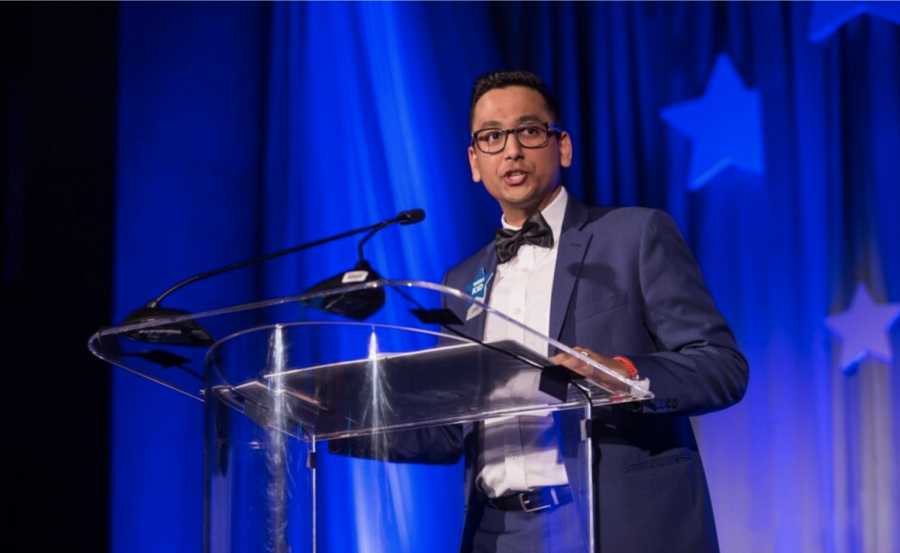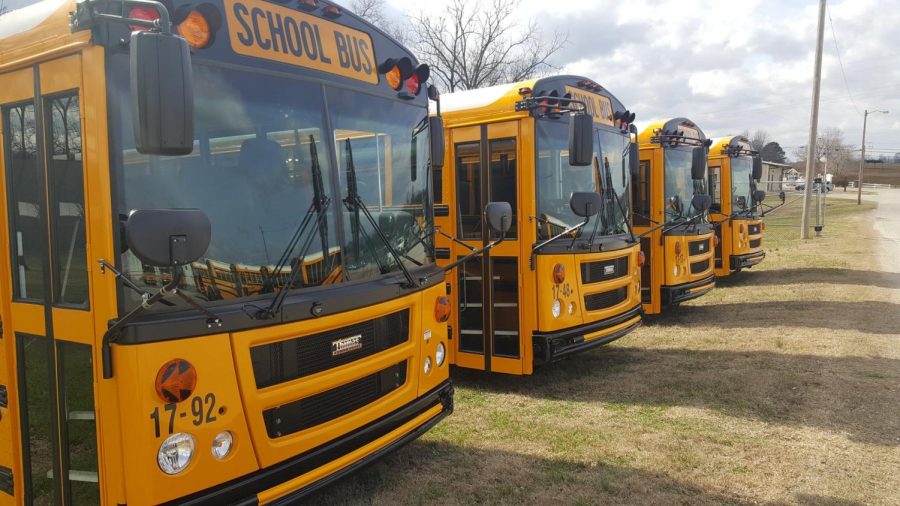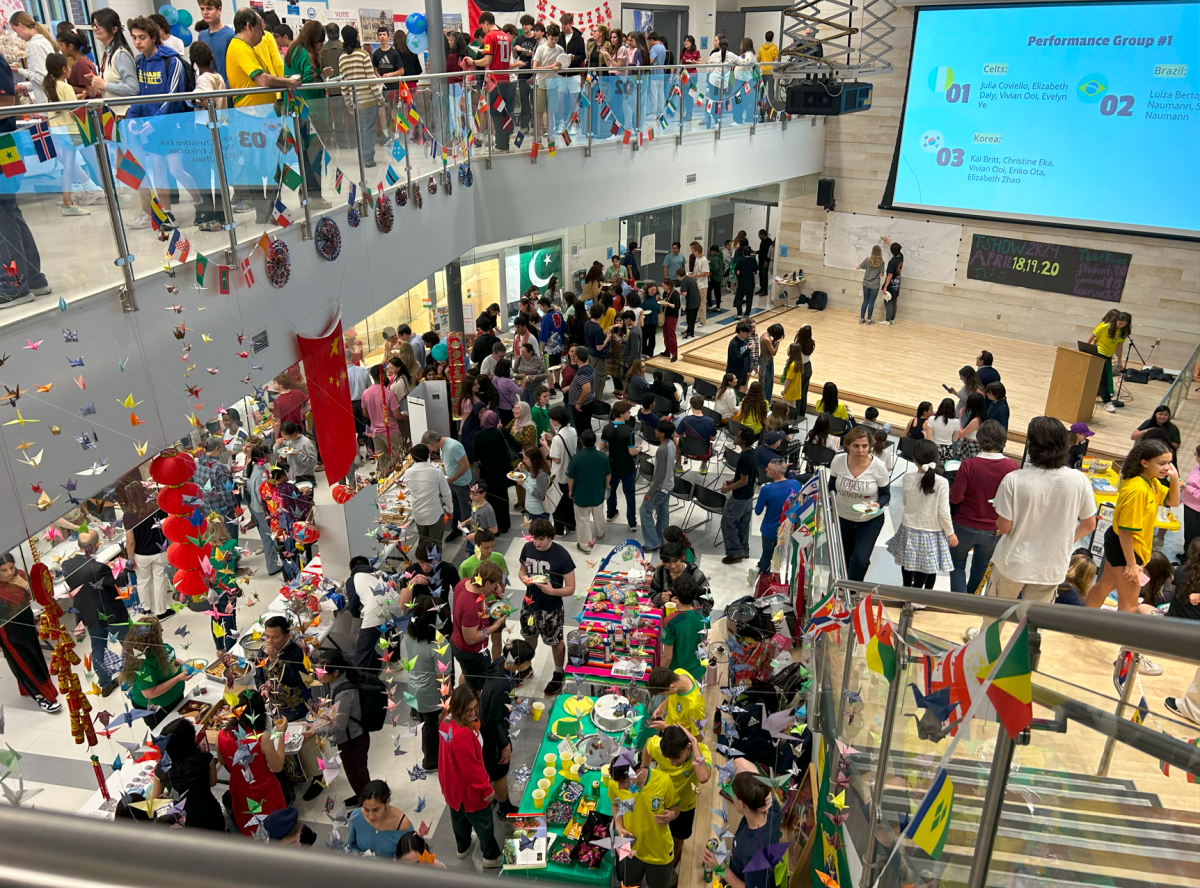Meet Ashwani Jain: Maryland’s millennial gubernatorial candidate
Photo courtesy of jainforgovernor.com
Jain emcees a Make-A-Wish Foundation event. Jain, who was a recipient of Make-A-Wish services as a cancer patient, has worked with the organization extensively since his recovery.
May 26, 2021
“I would be the nation’s first millennial governor and Maryland’s first governor of color,” Ashwani Jain, a candidate in the 2022 Maryland governor’s race, said, quoting his own gubernatorial campaign motto. When he realized that term limits will keep Maryland governor Larry Hogan from running in the upcoming election cycle, Jain decided that it was now his chance to run. Without an incumbent candidate running against him, Jain believes he could have an opportunity to implement the progressive reforms he championed in his career at nonprofits and other political offices. Though this won’t be Jain’s first time running for office, it certainly won’t be his last — after all, he’s only 31.
A Winston Churchill High School graduate, Jain is the youngest candidate running for Governor. Though Jain lost his last campaign for an at-large seat on the Montgomery County Council to Gabe Albornoz, Evan Glass, Will Jawando and Hans Riemer and will be a contender in a crowded field — there are expected to be dozens of gubernatorial candidates vying for party nominations — challenging odds are not stopping him anytime soon, he said.
Jain grew up in Maryland with immigrant parents who owned a small business. In eighth grade, he was diagnosed with non-Hodgkin’s lymphoma, a cancer rarely found in children. During his treatment, Jain witnessed firsthand children suffering from illnesses while their parents were left unable to cover the exorbitantly high medical costs. It was during his treatment that Jain first recognized the disconnect between legislation and those who are affected by it, he said.
Before his diagnosis, Jain had never aspired to become involved in politics. But at a moment when he didn’t know whether he would survive his illness, his perspective changed.
“I thought to myself: ‘Okay, if I’m given a second chance at life, I’m going to make it count,’” he said. “That’s what turned me from survivor to advocate, where I was hoping to not only help my immediate community, but really all those who are struggling. This idea of public service and politics became my therapy.”
The Make-a-Wish foundation, a non-profit which grants children with terminal illnesses a chance to realize their dreams, reached out to Jain while he was receiving treatment for his cancer. Thirteen-year-old Jain wished to meet actor Denzel Washington. He was able to travel to New York City with his family to watch his childhood idol perform in a Broadway show, and he even got to spend time with Washington afterwards.
“During those 15 minutes with him, nothing else mattered — my cancer, all the struggles and pain disappeared,” Jain said. “That was the first time in my life when something I did brought joy to my family. So I said, you know what, there are a lot of kids and families who are worse off than I am. Let me volunteer for this organization so I can replicate this feeling of joy to as many kids as possible.”
After successfully recovering, Jain started to work with Make-a-Wish, sharing his story with other kids and helping grant their wishes. Soon thereafter, Jain became a Make-a-Wish ambassador, able to help children in a similar position that he had been in as a Make-a-Wish recipient. His years working with the charity led Jain to fall in love with volunteering, he said.
As a high school senior at Churchill, Jain was able to work locally with Barack Obama’s 2008 presidential campaign. Although he did not always feel qualified for the work he was conducting, he still “showed up” to try and help his community, he said.
“I did the work, and I was able to work my way from a volunteer to working directly with [Obama] in his White House,” he said.
After graduating from Churchill, Jain enrolled at the University of Maryland to pursue a double major in business management and political science. Jain continued his volunteer work on the Obama campaign, helping to organize college students across the state who had never been politically involved before.
To Jain, his political activism was never about chasing the prestige of the presidential campaign trail; it was about doing the most good possible.
“When I got involved in the Obama campaign, that was by accident,” he said. “It was because I felt empowered that I could make a difference in my community and also at a larger scale. I always focused on the issues and the people that we were serving.”
After President Obama took office, Jain transitioned from a campaign staffer to an administration official, helping the Presidential Personnel diversify applications for political appointees to the federal government and acting as the Director of Outreach for then-Vice President Joe Biden’s Cancer Moonshot Initiative.
Jain intends to give young people a seat at the table and keep the youth engaged in his own campaign. As a millennial, he understands what it feels like to be dismissed, he said, which is why roughly half of his senior advisors — campaign advisors who typically have an abundance of experience in running campaigns — are students.
“There’s always talk amongst Democratic leaders that we need more young and diverse volunteers, but there’s a disconnect with their words and their actions,” Jain said. “Not only do I often find myself still as one of the youngest and few people of color at political meetings and events, but I’ve also seen such a quick dismissal anytime people like me attempt to pursue leadership roles that challenge the status quo or focus on issues that we are going to be held accountable for in the future, even when we are prepared to do the necessary work.”
Jain’s campaign gives real roles to volunteer high schoolers and even middle schoolers by asking for their input on policy and outreach strategies, he said.
Annabelle South, a senior at Walter Johnson High School, met Jain a few years ago through a gun violence seminar he had led. She first volunteered for his unsuccessful Montgomery County Council bid, where Jain, the only candidate in the race endorsed by Biden, ran amongst 33 Democrats and finished eighth. Now, South serves as his Director of Outreach for High School.
Jain has made an impact on South by extending his philosophy of just showing up and helping the community, she said.
“When he first reached out saying, ‘Would you like to be a senior advisor and high school outreach director,’ I thought he must have meant to send it to someone else,” South said. “I did not feel qualified for these positions, but I showed up, and I’ve learned that I’m fully capable of doing this.”
As Outreach Director, South holds the responsibility of managing and growing Jain’s High School Outreach team and creating new initiatives with her team to get more people involved with his campaign. South also helps run Jain’s TikTok and Instagram accounts. Currently, her department consists of 33 students with creative licenses to come up and present ideas to her and Jain.
Walter Johnson junior Ruby Topalian, who serves on South’s high school outreach team, believes that Jain listens closely to the ideas of every student on his campaign. When she noticed that the campaign was performing poorly with students who live in low income neighborhoods, she pitched the idea to Jain and South of an outreach project focusing on disadvantaged areas.
“He was so excited and so open to everything I had to say,” Topalain said. “I started talking to Ashwani and Anabelle about expanding our outreach, and now, I’m coordinating a low income outreach project with my small team.”
Receiving input from students, families and individual voters through direct Zoom meetings is Jain’s favorite part of the campaign. Conversations with stakeholders make him more mindful of how he’s approaching policy decisions, he said.
If elected as governor, Jain intends to focus on making the state government more inclusive and diverse by directing money out of politics and into structural reforms through the implementation of his “Relief, Recovery, Reform” agenda, he said.
“Oftentimes, we hear the same debates over the same issues at every election without much progress,” he said. “That’s why I’m talking about a ‘Relief, Reform, Recovery’ agenda, which not only addresses how all these issues are interconnected, but specifies what we can do in the short term and long term, including ways to pay for my ideas.”
As a product of public schools, one issue Jain brings a unique perspective to is educational policies, he said. When attending Glen Haven Elementary School in Wheaton, Jain experienced how the Title I standing of his school, indicative of its eligibility for federal aid, compared with the environment in which he learned.
“We lived in the wealthiest county in the state, and yet there was still mold on the ceilings,” he said. “The school was crowded with students but with great teachers and educators who just didn’t have the support they needed.”
At Hoover Middle School, Jain felt as though the people at his school, “from the bus driver to the cafeteria lady,” supported him and helped create a safe place while he was getting treated for cancer. That support system allowed Jain to realize how schools not only give their students an education, but also provide a community. With that mindset, Jain plans to prioritize reducing teacher shortages, increasing the number of diverse teachers and reprioritizing public school funding.
Jain never thought he would be where he is now, he said.
“I was a nobody; I didn’t have any connections, but I just showed up,” Jain said. “A lot of life is showing up and doing the hard work, and doing it sincerely, not forgetting where you come from and not forgetting about the people that you’re working for. That allowed me all these opportunities I had never thought of.”







